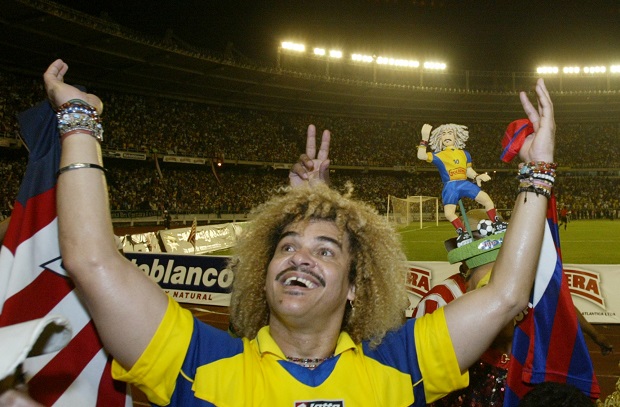
In this Feb. 1, 2004, file photo, Carlos “El Pibe” Valderrama waves at the end of an exhibition game to formalize his retirement from professional soccer in the coastal city of Baranquilla, in northern Colombia. El Pibe lived up to his candid nature by declaring that the teams he captained in the 1990’s would have advanced further in World Cup play had the players been freed from chastity. AP
BOGOTA — If you’re intending to score in a World Cup match, should you score the night before?
It’s a question that prompts coaches to set rules, players to seek understanding from wives and lovers, and fans everywhere to debate fervently, with many adamantly believing that abstaining from sex improves performance on the field.
The age-old argument has been triggered anew by Mexico’s coach Miguel Herrera, who told the newspaper Reforma last month that he expects his players to refrain from any horizontal samba during their stay in Brazil, where the monthlong tournament opens next week. The remark sparked a lively debate in the media, prompting Herrera to clarify that he wasn’t banning sex outright, just urging his players to behave prudently — along the lines proposed by his Brazilian counterpart, Luis Felipe Scolari, who has cautioned against attempting any bedroom “acrobatics.”
Not everyone is so reserved. Colombian star Carlos “El Pibe” Valderrama lived up to his candid nature by declaring that the teams he captained in the 1990s would have advanced further in World Cup play had the players been freed from chastity.
Theories linking sex to athletic performance date to at least the ancient Greeks, who believed safeguarding a man’s sperm was important for spurring aggression needed to perform well in the arena. There’s little scientific evidence, however, to support abstinence as a performance enhancer.
A 1995 study published in the Journal of Sports Medicine and Physical Fitness said performance on a treadmill test was unaffected by whether or not the participant had coitus 12 hours before.
Experts agree that lovemaking isn’t too strenuous for otherwise healthy people. A University of Montreal study in 2013 found men burned about 100 calories on average — or about the equivalent of 20 minutes of yard work.
Indeed, many athletes and experts swear by a little nookie the night before a big game, claiming it can relieve stress and induce restorative sleep.
More than sexual contact itself, what worries coaches is the all-night revelry and boozing indulged in by athletes in the prime of their youth. Scandalous reports about carousing athletes are not uncommon, such as those describing a party with prostitutes involving Spanish players at last year’s Confederations Cup soccer tournament in Brazil.
“It comes down to coaches not trusting the little devils,” Pamela Peeke, a physician and spokeswoman for the American College of Sports Medicine, told The Associated Press.
Herrera may have clear reasons to try to corral the fun-seeking tendencies of his players.
In September 2010, two Mexican national team players were suspended and several others fined for indiscipline over a postgame party in the northern city of Monterrey. Local news media reported prostitutes were involved. Sports analysts speculated the six-month suspension given Carlos Vela, who is widely considered Mexico’s top striker, is the reason he declined to play for the national team at the World Cup this year.
Many European teams, including Germany and Spain, have a strict ban on sex before matches, allowing wives and girlfriends to visit players at their hotel only on off-days.
The fact that sex still comes up for debate reflects widespread sexism in sports and a lack of male maturity, said Peeke, who is a triathlete and worked as a physician adviser to the Washington Wizards NBA basketball team.
While women also produce testosterone, they do so at levels far below that of men, she says. And nobody fusses over the monastic rites, or lack thereof, of female athletes before major female sporting events.
“There’s a widely held belief that men just can’t rein it in,” Peeke said.
RELATED STORIES
Love, sex and football: A Brazilian extravaganza awaits
Brazil fights sex tourism, child prostitution ahead of World Cup

